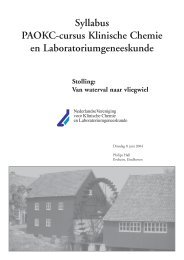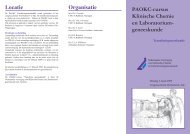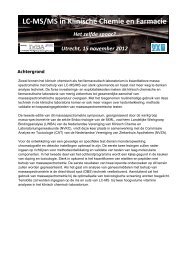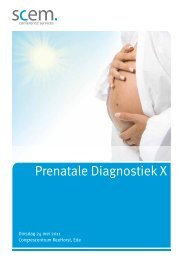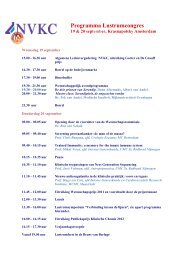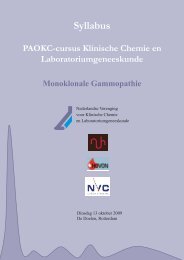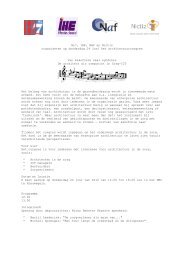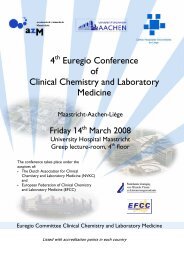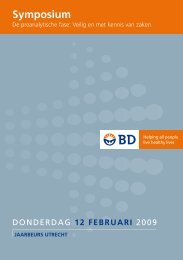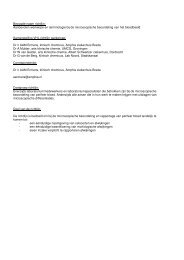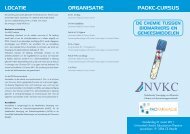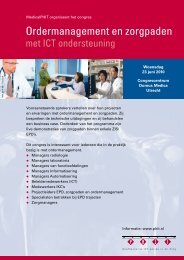Ned Tijdschr Klin Chem Labgeneesk 2004 - NVKC
Ned Tijdschr Klin Chem Labgeneesk 2004 - NVKC
Ned Tijdschr Klin Chem Labgeneesk 2004 - NVKC
Create successful ePaper yourself
Turn your PDF publications into a flip-book with our unique Google optimized e-Paper software.
67. Danpure CJ, Purdue PE, Fryer P, Griffiths S, Allsop J,<br />
Lumb MJ et al. Enzymological and mutational analysis<br />
of a complex primary hyperoxaluria type 1 phenotype<br />
involving alanine:glyoxylate aminotransferase peroxisome-to-mitochondrion<br />
mistargeting and intraperoxisomal<br />
aggregation. Am J Hum Genet 1993; 53: 417-432.<br />
68. Bennett MJ, Pollitt RJ, Goodman SI, Hale DE, Vamecq J.<br />
Atypical riboflavin-responsive glutaric aciduria, and deficient<br />
peroxisomal glutaryl-CoA oxidase activity: a new<br />
peroxisomal disorder. J Inherit Metab Dis 1991; 14: 165-<br />
173.<br />
69. Drenth JP, Cuisset L, Grateau G, Vasseur C, van de Velde-<br />
Visser SD, de Jong JG et al. Mutations in the gene<br />
encoding mevalonate kinase cause hyper-IgD and periodic<br />
fever syndrome. International Hyper-IgD Study Group.<br />
Nat Genet 1999; 22: 178-181.<br />
70. Houten SM, Kuis W, Duran M, de Koning TJ, van Royen-<br />
Kerkhof A, Romeijn GJ et al. Mutations in MVK,<br />
encoding mevalonate kinase, cause hyperimmunoglobulinaemia<br />
D and periodic fever syndrome. Nat Genet 1999;<br />
22: 175-177.<br />
71. Waterham HR. Inherited disorders of cholesterol biosynthesis.<br />
Clin Genet 2002; 61: 393-403.<br />
72. Eaton JW, Mouchou MA. Acatalasemia. In: Scriver CR,<br />
Beaudet AL, Sly WS, Valle D, editors. The Metabolic and<br />
Molecular Basis of Inherited Disease. McGraw-Hill, 1995;<br />
2371-2383.<br />
73. Avela K, Lipsanen-Nyman M, Idanheimo N, Seemanova<br />
E, Rosengren S, Makela TP et al. Gene encoding a new<br />
RING-B-box-Coiled-coil protein is mutated in mulibrey<br />
nanism. Nat Genet 2000; 25: 298-301.<br />
74. Kallijarvi J, Avela K, Lipsanen-Nyman M, Ulmanen I,<br />
Lehesjoki AE. The TRIM37 gene encodes a peroxisomal<br />
RING-B-box-coiled-coil protein: classification of mulibrey<br />
nanism as a new peroxisomal disorder. Am J Hum Genet<br />
2002; 70: 1215-1228.<br />
75. Wanders RJA, Barth PG, Schutgens RBH, Heijmans HSA.<br />
Peroxisomal disorders: Post- and prenatal diagnosis based<br />
on a new classification with flowcharts. Int Pediatr 1996;<br />
11: 203-214.<br />
76. Smeitink JA, Beemer FA, Espeel M, Donckerwolcke RA,<br />
Jakobs C, Wanders RJA et al. Bone dysplasia associated<br />
<strong>Ned</strong> <strong>Tijdschr</strong> <strong>Klin</strong> <strong>Chem</strong> <strong>Labgeneesk</strong> <strong>2004</strong>, vol. 29, no. 1<br />
with phytanic acid accumulation and deficient plasmalogen<br />
synthesis: a peroxisomal entity amenable to plasmapheresis.<br />
J Inherit Metab Dis 1992; 15: 377-380.<br />
77. Braverman N, Steel G, Obie C, Moser AB, Moser HW,<br />
Gould SJ et al. Human PEX7 encodes the peroxisomal<br />
PTS2 receptor and is responsible for rhizomelic chondrodysplasia<br />
punctata. Nat Genet 1997; 15: 369-376.<br />
78. Motley AM, Hettema EH, Hogenhout EM, Brites P, ten<br />
Asbroek AL, Wijburg FA et al. Rhizomelic chondrodysplasia<br />
punctata is a peroxisomal protein targeting disease<br />
caused by a non-functional PTS2 receptor. Nat Genet<br />
1997; 15: 377-380.<br />
79. Purdue PE, Zhang JW, Skoneczny M, Lazarow PB. Rhizomelic<br />
chondrodysplasia punctata is caused by deficiency<br />
of human PEX7, a homologue of the yeast PTS2 receptor.<br />
Nat Genet 1997; 15: 381-384.<br />
80. Houten SM, Romeijn GJ, Koster J, Gray RGF, Darbyshire<br />
P, Smit GPA et al. Identification and characterization of<br />
three novel missense mutations in mevalonate kinase<br />
cDNA causing mevalonic aciduria, a disorder of isoprene<br />
biosynthesis. Hum Mol Genet 1999; 8: 1523-1528.<br />
81. Grunsven EG van, Mooijer PAW, Aubourg P, Wanders<br />
RJA. Enoyl-CoA hydratase deficiency: identification of an<br />
new type of D-bifunctional protein deficiency. Hum Mol<br />
Genet 1999; 8: 1509-1516.<br />
Summary<br />
Peroxisomal diseases: metabolic and molecular basis and<br />
laboratory diagnosis. Wanders RJA, Duran M, Poll-The BT,<br />
Waterham HR. <strong>Ned</strong> <strong>Tijdschr</strong> <strong>Klin</strong> <strong>Chem</strong> <strong>Labgeneesk</strong> <strong>2004</strong>; 29:<br />
2-23<br />
Peroxisomal disorders are relative newcomers in the area of<br />
inborn errors of metabolism. In recent years much has been<br />
learned about these disorders as a consequence of the<br />
increased knowledge about the functions and biogenesis of<br />
peroxisomes in humans. This has led to the identification of<br />
the metabolic and molecular basis of a range of peroxisomal<br />
disorders as discussed in this review article.<br />
Keywords: peroxisomes; genetic diseases; phospholipids; fatty<br />
acids; Zellweger syndrome<br />
23



